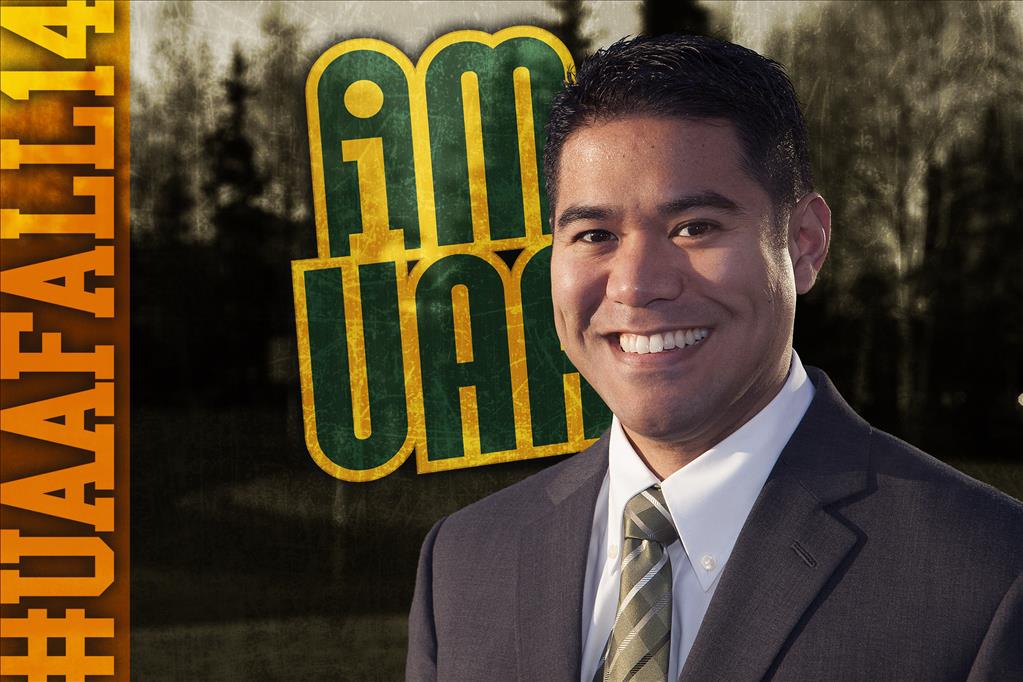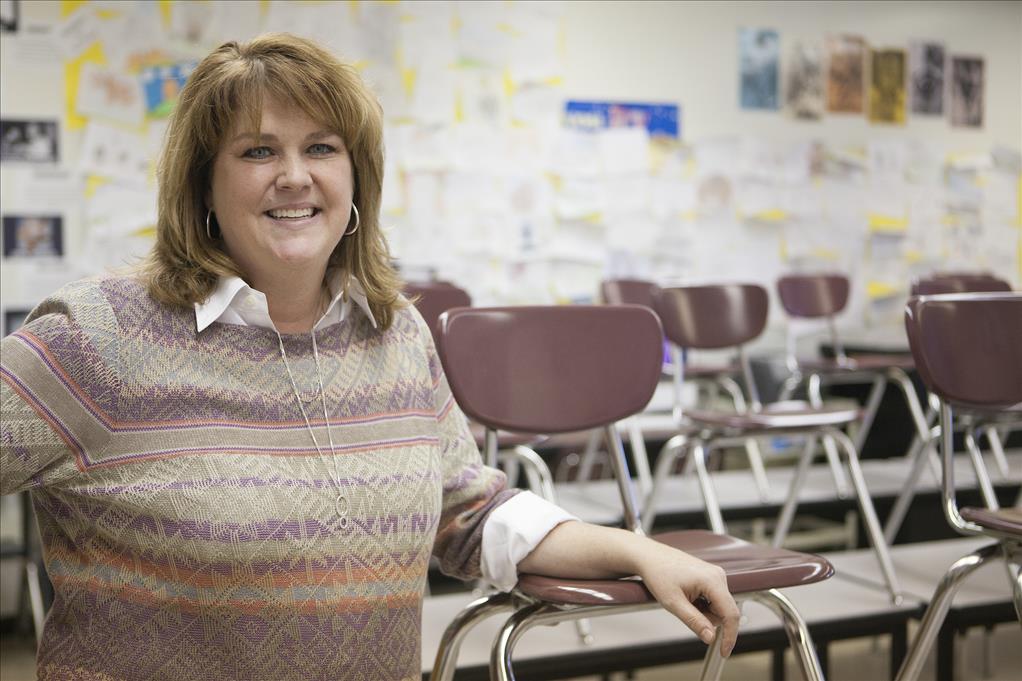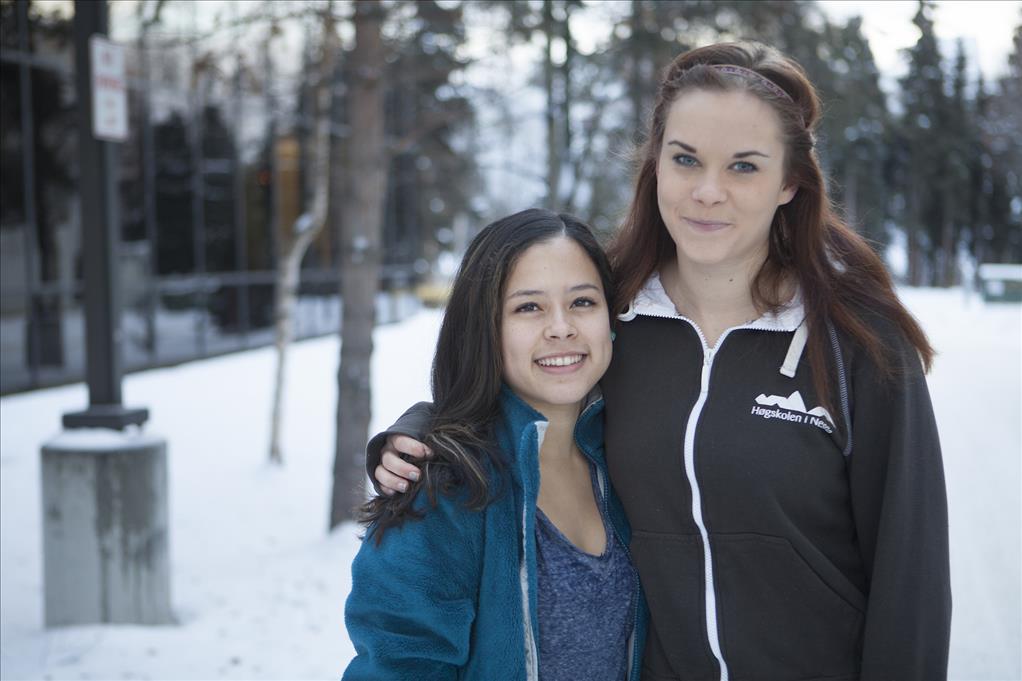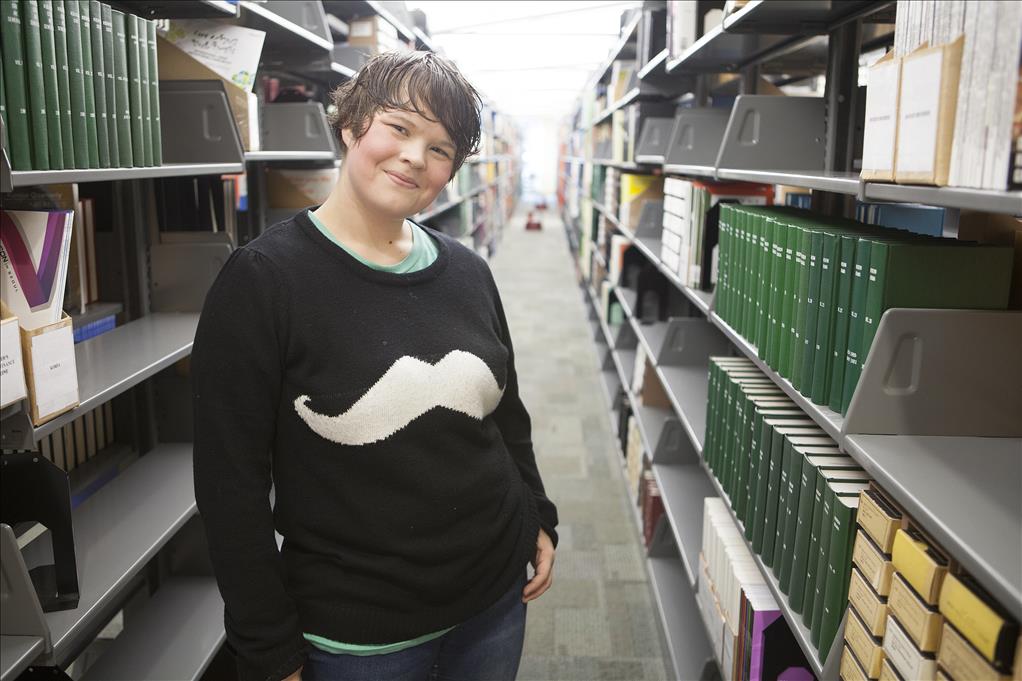Kidney Foundation helps propel nursing careers
by Tracy Kalytiak |
Amber Bosch was lying in bed one night a few years ago, thinking about her life at UAA and where she wanted to steer her college career.
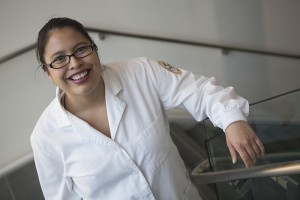
The Alaska Kidney Foundation recently gave a scholarship to Amber Bosch, a UAA nursing student. The Foundation has given a cumulative total of more than $563,000 in scholarship to students in UAA's nursing program. (Photo by Philip Hall/University of Alaska Anchorage)
"Then I heard sirens outside," said Amber, a first-generation college student from Hoonah who was raised in the Tlingit culture. "I'm from a small town; whenever we heard sirens, it was a big deal. It piqued my interest. I was thinking, 'I want to help people.' I decided I would just check out the nursing program, and I've loved every minute of it."
Amber's high grades reaped scholarships, which have helped her focus on her studies and move toward her goal of a nursing degree. Alaska Kidney Foundation provided Amber's most recent award, for $1,500, but cumulatively, the Foundation has donated $563,000 in scholarship assistance to students in UAA's School of Nursing.
"That scholarship will make it that much easier and that much quicker," Amber said of her academic career. "I've already worked with patients with renal issues. It's just getting so ubiquitous."
Growing an educated workforce
Emerita Professor of Nursing Tina DeLapp served as director of UAA's School of Nursing from 1996-2004 and wrote the original proposal for scholarships from the Alaska Kidney Foundation.
"They've been giving us money since then, every year," she said.
Now, DeLapp serves on the board of directors for the Foundation.
One of the goals of the Kidney Foundation, DeLapp said, is to ensure there is a well-prepared work force in Alaska to meet the needs of people with chronic kidney disease-both in terms of preventing kidney disease and treating people who have kidney disease.
"That's the issue for providing nursing scholarships," she said, "so that nurses can afford to get through the program."
A UAA nursing student pursuing a bachelor's degree can expect the four years of education, with the expense of living in a dorm included, to cost a total of approximately $86,514.
The Alaska Kidney Foundation Scholarship is the largest single private scholarship at UAA. It has offered an average of 35 scholarships each year, between 2002-2014. The total number of scholarships it's granted is nearing 300.
The Kidney Foundation has also funded development and delivery of an upper-division nursing elective focused on kidney care.
"Students have the opportunity to get additional content on how to keep kidneys healthy, prevent kidney diseases and learn to be on the alert for and minimize kidney-disease risks people face while hospitalized for another condition," DeLapp said.
Fourteen nursing students at UAA completed that renal care course in 2013; 16 students completed the course this year.
"A student in the baccalaureate program can get up to $3,000 a year," DeLapp said. "It's a pretty hefty scholarship and the monies have been spread all over the state."
Taking it home
Nursing will open a way for Amber to help her community-either here in Anchorage or back in Hoonah-and make it possible for her to enjoy the secure life she wanted but didn't always have while growing up.
"I grew up in poverty," she said. "A constant challenge for me is coming from a background as low income as mine. This means I sometimes don't know how I'm going to pay for food, gas, electric and the like all at once and that I've got nothing to fall back on as far as family assistance goes. My father is wonderful and tries to help, but isn't always able to as a self-employed Northwest Coast artist. My mother is a hairdresser and can't help."
If all goes as planned, Amber will receive her bachelor's degree in nursing next summer. She still needs to work-as a lab consultant at Sally Monserud Hall, helping students navigate the technical aspects of certain software programs, print, set document margins-but the student job carries a nice perk.
"We get to study, which is fantastic," she said. "I had some financial worries, was thinking how am I going to finish this last year out. I'm living with my boyfriend and a roommate in a duplex but wasn't sure how I was going to manage. He's going to pull a little bit of my weight through nursing school, but I still need to keep the job on top of that. You never know when you're going to need the extra money."
Amber puts in hours of time practicing clinical skills at the Alaska Native Medical Center, working with a variety of patients in the medical-surgical unit, and has also worked in the multi-service unit at the Joint Base Elmendorf-Fort Richardson hospital.
"Looking in from the outside, I didn't know nurses had so much independence," she said. "I thought everything was just at the doctor's beck and call-which can be true to an extent for orders, but there's a lot of standing-order type of things where it's the nurse's judgment. We have to be on top of it with critical thinking and very fast decision making. That's one thing that surprised me and drew me in more to nursing."
Amber hopes to find as much funding as she can without having to resort to taking out loans.
"I would like to provide a better life for myself and any children I have," she said. "[The scholarship help is] bringing me closer to my goal by helping me get higher grades, do better on my tests, stay home to study, meet up with my study groups-pretty much everything that comes with being able to spend more time on school, put a better focus on school."
Written by Tracy Kalytiak, UAA Office of University Advancement
 "Kidney Foundation helps propel nursing careers" is licensed under a Creative Commons Attribution-NonCommercial 4.0 International License.
"Kidney Foundation helps propel nursing careers" is licensed under a Creative Commons Attribution-NonCommercial 4.0 International License.










